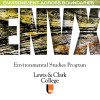A More Inclusive ENVS
The ENVS Program is thoroughly committed to Lewis & Clark College’s efforts toward equity and inclusion. We do this in a variety of ways, summarized below with selected scholarly references.
- Environmental justice is a prominent topic in environmental studies. Our students read its classics (Bullard 1990), more contemporary approaches (Walker 2012), and even critiques from the inside (Foreman 2011). Students thus learn both the importance and the complexity of pursuing justice in environmental contexts, including recent applications such as climate justice (Shue 2014).
- Following our situated approach to environmental analysis, students learn about environmental justice in Portland, Oregon, a city marked both by strong green commitments and a history of racial exclusion (Stroud 1999; Goodling et al. 2015). Situated contexts like Portland help students grapple with the historical and current realities facing efforts toward equity and inclusion.
- This situated approach compels us to consider the limitations of our U.S. environmental heritage (Guha 1989), and efforts to stretch equity and inclusion to the global sphere (Sikor and Newell 2014). Most of our students come from a U.S. environmental background, but Lewis & Clark College is blessed with a number of international students and renowned overseas and off-campus programs, providing students with key opportunities to explore these questions in broader contexts.
- Equity and inclusion entail not just recognition of difference, but productive communication across difference—including people with whom we may disagree (Proctor et al. 2018). Our students build skills in communication, outreach, and collaboration via a required ENVS course, Environmental Engagement (ENVS 295), pursuing partnerships and projects that intentionally stretch to include a wider range of voices than are typically heard.
- These efforts collectively inform our general approach to environmental studies, summarized as Environment Across Boundaries (ENVX): a commitment to equip students with skills to cross intellectual, geographic, and communication boundaries. Research has suggested challenges to inclusiveness in typical U.S. environmental higher education (Taylor 2018; Johnson et al. 2020), yet there are opportunities to “unsettle” the environmental curriculum in productive ways (Proctor et al. 2015), and our students both contribute to, and benefit from, this expansive approach.
We are keen on listening to our students and the wider community as you reflect on how we can continue to create a more inclusive ENVS Program; please contact the ENVS Program if you have ideas, or for more information.
Cited references
-
Bullard, Robert D. 1990. Dumping in Dixie: Race, Class, and Environmental Quality. Boulder, CO: Westview Press.
- Foreman, Christopher H. 2011. The Promise and Peril of Environmental Justice. Washington, D.C: Brookings Institution Press.
-
Goodling, Erin, Jamaal Green, and Nathan McClintock. 2015. “Uneven Development of the Sustainable City: Shifting Capital in Portland, Oregon.” Urban Geography 36 (4): 504–27.
-
Guha, Ramachandra. 1989. “Radical American Environmentalism and Wilderness Preservation: A Third World Critique.” Environmental Ethics 11 (1): 71–83.
-
Johnson, Erik W., Ali. O. Ilhan, and Scott Frickel. 2020. “Riding a Long Green Wave: Interdisciplinary Environmental Sciences and Studies in Higher Education.” Environmental Sociology, August, 1–16.
-
Proctor, James D., Jennifer Bernstein, and Richard L. Wallace. 2015. “Introduction: Unsettling the ESS Curriculum.” Journal of Environmental Studies and Sciences 5 (2): 195–99.
-
Proctor, James D., Jennifer Bernstein, Philip Brick, Emma Brush, Susan Caplow, and Kenneth Foster. 2018. “Environmental Engagement in Troubled Times: A Manifesto.” Journal of Environmental Studies and Sciences 8 (March): 362–67.
-
Shue, Henry. 2014. Climate Justice: Vulnerability and Protection. Oxford, England: Oxford University Press.
-
Sikor, Thomas, and Peter Newell. 2014. “Globalizing Environmental Justice?” Geoforum 54 (July): 151–57.
-
Stroud, Ellen. 1999. “Troubled Waters in Ecotopia: Environmental Racism in Portland, Oregon.” Radical History Review 74 (1): 65–95.
-
Taylor, Dorceta E. 2018. “Racial and Ethnic Differences in the Students’ Readiness, Identity, Perceptions of Institutional Diversity, and Desire to Join the Environmental Workforce.” Journal of Environmental Studies and Sciences 8 (2): 152–68.
-
Walker, Gordon. 2012. Environmental Justice: Concepts, Evidence and Politics. Routledge.
Environmental Studies is located in room 343A of John R. Howard Hall on the Undergraduate Campus.
MSC: 62
email envs@lclark.edu
voice 503-768-7790
fax 503-768-7620
Symposium Advisor Jessica Kleiss
Environmental Studies
Lewis & Clark
615 S. Palatine Hill Road MSC 62
Portland OR 97219
